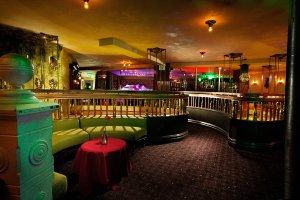
LAS VEGAS (AP) — It turns out that even in Sin City, some sins are hard to overlook.
The Palazzo hotel-casino on the Las Vegas Strip is trying to evict a 10-month-old nightclub for shows it says are so raunchy that they violate obscenity laws. It says actors — some nearly naked — toss condoms into the crowd and simulate sex acts and bestiality on stage.The club is seeking a restraining order to halt the closure, arguing that simulated sex acts don't constitute obscenity.
Casino officials "were well aware of our brand," said Sean Dunn, special events director at The Act, in an email statement, adding that representatives of the hotel-casino have frequently attended shows and did not complain.
Las Vegas Sands, which owns the casino, did not immediately respond to requests for comment.
The Act remains open for business while a district judge considers its fate, but the fight over its future has exposed an underlying reality in Vegas: While the city sells itself as a racy, no-holds-barred destination, there are limits.
"I think there's the perception that anything goes in Vegas — there's no boundaries, no lines," said Lynn Comella, a professor of sexuality and women's studies at the University of Nevada, Las Vegas. "In reality, nothing could be further from the truth."
That perception, in part, is fueled by what tourists see.
Trucks roll down Las Vegas Boulevard advertising "hot babes" delivered directly to hotel rooms, the phone book is full of come-ons for escorts and private dancers, and taxis and billboards feature scantily clad women who leave little to the imagination.
While Las Vegas is also rife with strip clubs, tourists won't find them along the Strip or in the city's hotel-casinos. They can take in a topless stage show or lounge at a European-style topless pool, but they have to catch a ride to a side street to see strippers.
"The goal for Las Vegas was to be naughty enough to attract you but not naughty enough to repel you," said Michael Green, a history professor at the College of Southern Nevada.
The city — which rises and falls on the pocketbooks of its 40 million annual visitors — must balance the sexiness with the sensibilities of foreign tourists and large, multinational casinos.
"It's highly sexualized and gets a lot of mileage out of that, but it's a very particular version of that," Comella said.
In The Act's case, Sands executives notified club officials on April 26 that they'd crossed a line with the show and were no longer welcome in the $15 million space. The casino giant wants to evict it, ending a 10-year lease.
The casino notified club officials after undercover security officers went into the venue in March. The details of the show were laid bare this week in court, when an investigator apologized for getting graphic and looked pained while describing some kinky scenes.
The club contends Sands "manufactured this 'breach' in an attempt to improperly evict" it.
"We believe we are on the leading edge of the next evolution of nightlife in Las Vegas and that The Act fills a niche for patrons looking for an alternative to the typical Las Vegas big-box club scene," Dunn said.
Those who stray outside the limits of what is considered acceptable in the city risk invoking the wrath of the state's powerful Gaming Control Board and losing their lucrative gambling permits.
The board smacked the Planet Hollywood casino with a $750,000 fine in 2009 amid accusations that employees at the independently owned Prive nightclub allowed toplessness, turned a blind eye to prostitution and physically and sexually assaulted patrons.
The board isn't investigating The Act and is waiting for the lawsuit to play out, according to chairman A.G. Burnett.
There's no doubt that Las Vegas markets itself as an adult playground, said Oscar Goodman, the larger-than-life former Las Vegas mayor who's often flanked by scantily clad showgirls, martini in hand.
"We have standards and we're not going to advocate illegal activity," he said. "Unless the sex goes out of the line, we embrace it."




